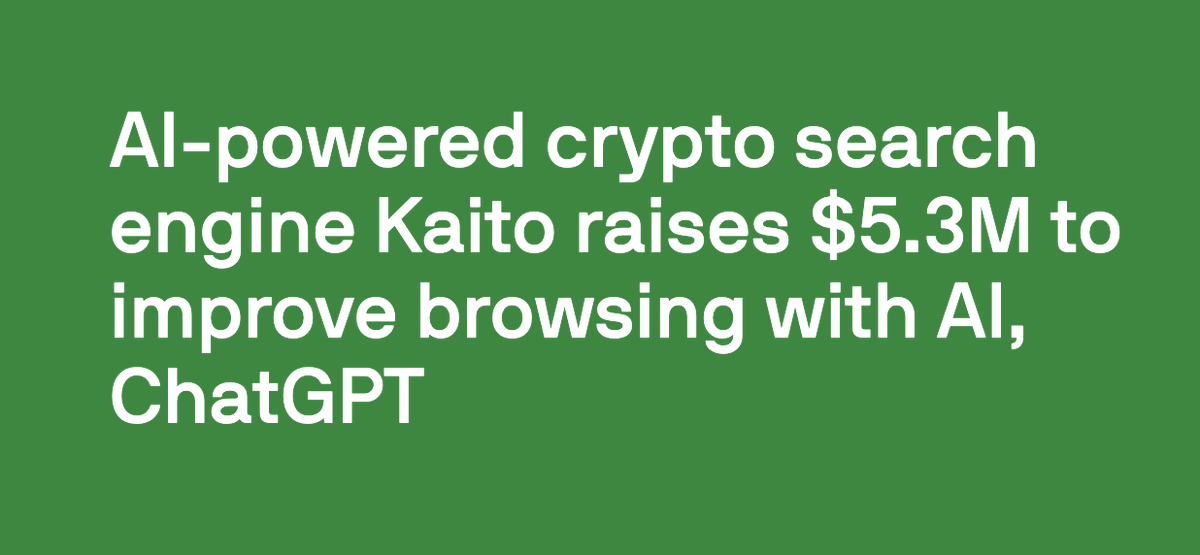1/ Kaito opening at $1B+ is very interesting.
It's not about InfoFi or airdrops or yap farmers.
It's about centralized companies launching tokens 🧵
It's not about InfoFi or airdrops or yap farmers.
It's about centralized companies launching tokens 🧵

2/ Historically there were 2 types of companies.
Offchain entities: centralized exchanges, custodians, data providers, RPC providers, research platforms, SaaS companies, etc
And onchain entities: L1s, L2s, staking providers, DEXs, lend/borrow platforms, etc
Offchain entities: centralized exchanges, custodians, data providers, RPC providers, research platforms, SaaS companies, etc
And onchain entities: L1s, L2s, staking providers, DEXs, lend/borrow platforms, etc
3/ These entities raise money in two very different ways.
Offchain: set up in Delaware and then raise money via the traditional Seed, Series A, Series B, Series C, Series D, etc... until an IPO
Onchain set up as DAOs and then raise money via Seed, Series A... then token!
Offchain: set up in Delaware and then raise money via the traditional Seed, Series A, Series B, Series C, Series D, etc... until an IPO
Onchain set up as DAOs and then raise money via Seed, Series A... then token!
4/ But along the way, the flow for offchain fundraising broke down.
a) The VC mania of 2021 drove insane valuations. Companies raised at 100x revenue. Sounds good, but it wasn't
b) The IPO market dried up
c) Institutional capital hasn't come in at the later stages
a) The VC mania of 2021 drove insane valuations. Companies raised at 100x revenue. Sounds good, but it wasn't
b) The IPO market dried up
c) Institutional capital hasn't come in at the later stages

5/ So now, you have this big swath of companies that raised at insane valuations in 2021 who now need to raise again.
Unfortunately for them, if they raised again it would likely be a 60-80% down round.
For example, ABC company had $10M of revenue. They raised at 100x revenue in 2021 and got a $1B valuation. Now they have $20M of revenue but the multiple is only 15x revenue so their valuation is now $300M.
Unfortunately for them, if they raised again it would likely be a 60-80% down round.
For example, ABC company had $10M of revenue. They raised at 100x revenue in 2021 and got a $1B valuation. Now they have $20M of revenue but the multiple is only 15x revenue so their valuation is now $300M.
6/ If you're a founder, you will do anything to avoid that.
Down rounds can be a nightmare. It's demotivating for employees. Investors are pissed. You might have to fully recap which sucks.
In general it kills momentum.
Down rounds can be a nightmare. It's demotivating for employees. Investors are pissed. You might have to fully recap which sucks.
In general it kills momentum.

7/ Let's get back to Kaito.
Remember how there are two types of companies? Offchain and onchain.
Kaito would be have been bucketed as offchain.
They're not a DEX. They're not a chain. They're not an L2. They're not a staking provider. They're a research and data company.
Remember how there are two types of companies? Offchain and onchain.
Kaito would be have been bucketed as offchain.
They're not a DEX. They're not a chain. They're not an L2. They're not a staking provider. They're a research and data company.

8/ Again usually the funding for these types of companies is: Series A, Series B, Series C, etc... then IPO
But they broke the mold.
Instead of staying on this path, they launched a token.
And it went live at $1B+ ! Much higher than they would've got if they raised a round.
But they broke the mold.
Instead of staying on this path, they launched a token.
And it went live at $1B+ ! Much higher than they would've got if they raised a round.

9/ I see a lot of people talking about will price go up or down. For that, I have no idea.
But what I do know is that every founder of every "centralized" / offchain company is looking at this very closely.
The regulatory landscape has opened up.
Now if you're a founder, do you really want to go raise a downround? What if you could launch a token instead.
But what I do know is that every founder of every "centralized" / offchain company is looking at this very closely.
The regulatory landscape has opened up.
Now if you're a founder, do you really want to go raise a downround? What if you could launch a token instead.
10/ One of my predictions at the beginning of the year was that:
Centralized crypto companies start launching tokens
Tokens as a fundraising mechanism instead of tokens as the tech will becomes obvious.
This is the start of this happening.
Centralized crypto companies start launching tokens
Tokens as a fundraising mechanism instead of tokens as the tech will becomes obvious.
This is the start of this happening.
https://x.com/JasonYanowitz/status/1876704676596355235
11/ Short term, idk what happens.
But long term this is part of a trend that is getting very clear: all equity will get tokenized
Startup equity. Corporate equity. All of it. It's all coming onchain.
Congrats to @Punk9277 for leading the way. Excited to see what happens next.
But long term this is part of a trend that is getting very clear: all equity will get tokenized
Startup equity. Corporate equity. All of it. It's all coming onchain.
Congrats to @Punk9277 for leading the way. Excited to see what happens next.
12/ Btw if it's not abundantly clear, I am not a lawyer
This should be obvious but if you're thinking about doing this, go speak with actual lawyers
Thank you @milesjennings
This should be obvious but if you're thinking about doing this, go speak with actual lawyers
Thank you @milesjennings
https://x.com/milesjennings/status/1892602512366072073
• • •
Missing some Tweet in this thread? You can try to
force a refresh










